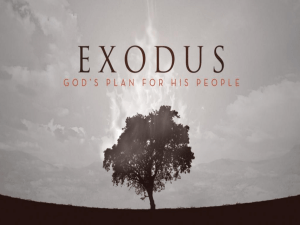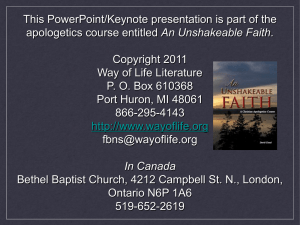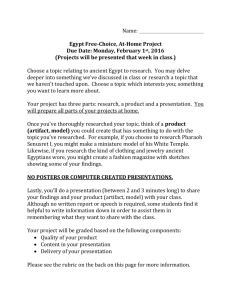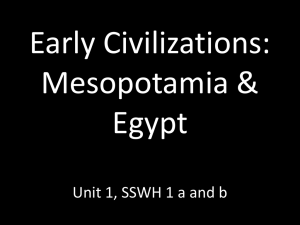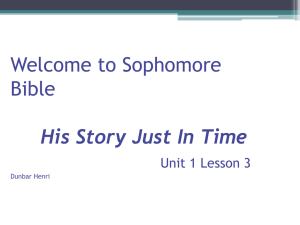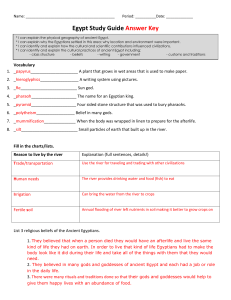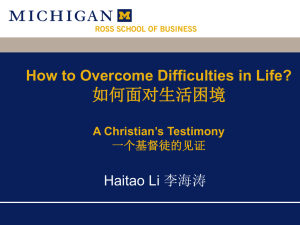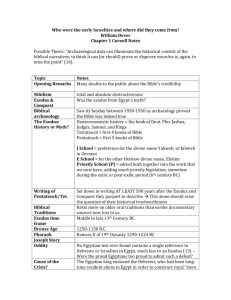DOC - key to the kingdom canada
advertisement
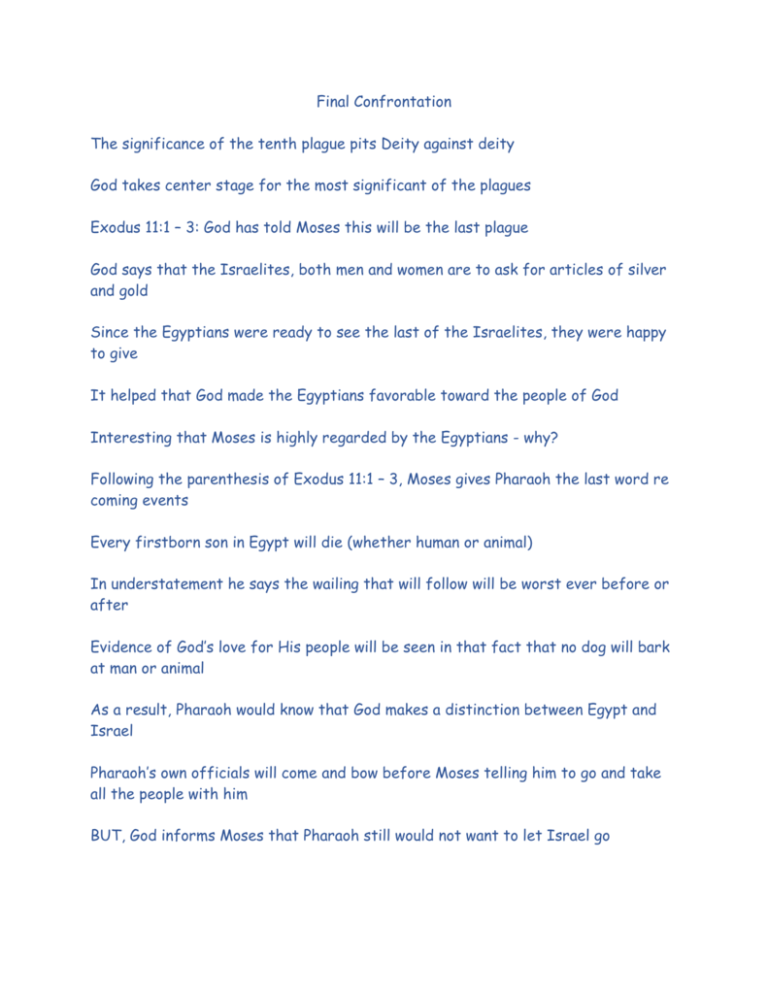
Final Confrontation The significance of the tenth plague pits Deity against deity God takes center stage for the most significant of the plagues Exodus 11:1 – 3: God has told Moses this will be the last plague God says that the Israelites, both men and women are to ask for articles of silver and gold Since the Egyptians were ready to see the last of the Israelites, they were happy to give It helped that God made the Egyptians favorable toward the people of God Interesting that Moses is highly regarded by the Egyptians - why? Following the parenthesis of Exodus 11:1 – 3, Moses gives Pharaoh the last word re coming events Every firstborn son in Egypt will die (whether human or animal) In understatement he says the wailing that will follow will be worst ever before or after Evidence of God’s love for His people will be seen in that fact that no dog will bark at man or animal As a result, Pharaoh would know that God makes a distinction between Egypt and Israel Pharaoh’s own officials will come and bow before Moses telling him to go and take all the people with him BUT, God informs Moses that Pharaoh still would not want to let Israel go It has been pointed out that the death of the firstborn would be a great blow to Egyptian society with the death of the firstborn of a whole generation The significance of the Passover as a memorial of the Exodus is introduced here This event carries importance throughout the history of Israel and also into the Christian age - Exodus 12:1-13:14; Leviticus 23:4 - 8; Numbers 9:1 - 14; 28:16 - 25; Deuteronomy 16:1 - 8; Joshua 5:10 - 12; 2 Kings 23:21 - 23; 2 Chronicles 35:1 - 19; Matthew 26:17 - 30; Mark 14:12 - 26; Luke 2:41 - 43; 22:7 - 23; 1 Corinthians 5:6 8 Seven Passovers are recorded in Scripture: Egypt, Exodus 12; wilderness, Numbers 9; Joshua - Joshua 5:10; Hezekiah - 2 Chronicles 30; Josiah - 2 Chronicles 35; postexile - Ezra 6:19; Jesus - Luke 22:15 Jewish tradition expected the Messiah to come during Passover He did not come in the Passover but become our Passover lamb making for the real Passover - John 18:28; 1 Corinthians 5:6 - 8; 1 Peter 1:19, 20 Instructions for the first Passover, vv. 1-13; future Passovers, vv. 1-2 Instructions for the Feast of Unleavened Bread, vv. 14-20; future feasts, v. 14 Instructions for the first Passover, vv. 21-28; future Passovers, vv. 24-27 Narrative of the tenth plague, vv. 29-42 Instructions for future Passovers, vv. 43-51 Mixing narrative and instruction, verses 1-28 and 43-51 frame the tenth plague and exodus from Egypt (vv. 29-42). Verses 1-28 divide into instructions for the first Passover (vv. 1-13), instructions for the feast of unleavened bread (vv. 14-20), and a reversion to the instructions for the first Passover (vv. 21-28). All three of these subsections contain statements affirming the Passover's significance for future generations (vv. 1-2, 14, 24-27). Verses 43-51 issue final instructions for future generations only. This framing structure, as well as the notice, "the Israelites did just what the Lord had commanded Moses and Aaron" (vv. 28, 50), indicate the significance of the Exodus event for Israel and her succeeding generations. "By fusing the common story with the ritual, the generation recalling the event is bound to the previous generations who told the same story. The ritual memorial both creates and maintains identity on the personal, communal, existential, historical, and eschatological levels." This distinction between the significance to the original participants as well as subsequent generations also explains discrepancies between this first Passover and later ones. For example, the selection of the lamb on the tenth day and eating in haste (standing with staff in hand and shoes on their feet, Exod 12:11) applied only to the first Passover and were omitted in later observances (Lev 23:5; Num 9:2-14; 28:16-17; Deut 16:1-8). Therefore, Jesus and the disciples reclined rather than standing with staff in hand and shoes on their feet (Exod 12:11; Luke 22:14) without violating the Passover law since these rules did not apply to later Passovers. 12:2-10 This month (ׁשֶ זַׁש ׁשֶ דֹ חַ ה, haḥōdeš hazzeh), which was the first month of the year (ׁשב ִב אהָה, hāʾābîb, the ears of corn; cf. 13:4; 23:15; 34:18; Deut 16:1), contains a double significance. Though the first month of the annual year, it also possesses the theological significance of the Passover, which commemorates the beginning of Israel as a nation freed and redeemed by Yahweh, who took the nation as his people. Verses 3-10 begin with instructions regarding the preparation and observance of this first Passover. No reason is given as to why the animal should be kept from the 10th to the 14th day, though three suggestions have been put forward. Choosing the animal on the tenth day: (1) allowed a period of observation to ensure the victim was "without blemish"; (2) allowed time for reflection on the Passover and Exodus; (3) avoided the three days of dark-ness created by the ninth plague (i.e., the 11th, 12th, and 13th, Exod 12:22). Whether "1" and "2" occurred or not, "3" fits well with the text because the 14th would be the first day of light, making possible the Passover's celebration. The lamb chosen was to be (1) without defect (םב אִָת, tāmîm, "perfect, without blemish," v. 5), (2) consumed entirely when eaten, and (3) guarded (תְׁ אִ ְׁהִַ ַמם, ləmišmereth) from the moment of its selection on the tenth day till its slaughter at twilight (v. 6). The blood of the slaughtered animal was to be put... on the sides and tops of the doorframes of the houses where they eat the lambs (v. 7). The animal was to be eaten That... same night[,]... the meat roasted over the fire, along with bitter herbs, and bread made without yeast (v. 8). The entire ceremony represented a new start for the nation and served as a feast of gratitude, the blood signifying the mark of protection, the bitter herbs indicating their bondage, and unleavened bread representing the haste in their departure. 12:11-12 Because this first Passover required Israel to be ready for an immediate departure, Yahweh required Israel to eat this particular meal with your cloak tucked into your belt, your sandals on your feet and your staff in your hand (v. 11). Yahweh closed with the affirmation that the preceding nine plagues, as well as this coming tenth, was an attack on the gods of Egypt, in which he affirmed his identity as the only true God, ָ ( ָׁשהׁש ִִנאʾănî yhwh), "I am Yahweh," echoing the affirmation he made to Moses just prior to the commencement of the plagues (v. 12; cf. 6:2). I will bring judgment on all the gods of Egypt (12b) is fitting for the climaxing final plague. Yahweh had been waging war against Egypt and her pantheon contra Propp who argues that Yahweh "announces he will punish all of Egypt's gods, not that he has punished some of them." 12:13 Because this final and climaxing plague was directed against Pharaoh, who himself was considered a god by the Egyptians, it includes all that has preceded before. With this final plague Yahweh proved his superiority over all Egypt's pantheon, including her king. Verse 13 closes out the pericope by summarizing the purpose and significance of the blood as a saving and protective agent, When I see the blood, I will pass over you. No destructive plague will touch you when I strike Egypt. These fourteen verses of theological narrative interpret and energize the Exodus event for the participants as well as succeeding generations, reminding them from where they have come. 12:14-20 These liturgical instructions were given for the generations to come (v. 14) as the impossibility of gathering for a holy assembly on the day they were to exit Egypt indicates. Such didactic material reinforced the significance of this event upon Israel's mind as the foundation mechanism for the nation's existence (v. 17) in a way typical of the Lord's Supper as the basis for Christianity—Jesus is our Passover lamb. This... day (ׁשֶ זַׁש ׁשֶ ׂהּיַ ת, hayyôm hazzeh, v. 14) refers to the day of the exodus inaugurated by the tenth plague (cf. vv. 40-41). The feast began after dark on the 14th day; they were to abstain from leaven for seven days (v. 15). The 15th and 21st of Abib were special days—they refrained from work and gathered in a holy assembly. Those who disobeyed must be cut off from Israel (v.15). 12:21-28 Liturgical material again combines with narrative describing Israel's protection during the tenth plague. Thus verses 21-23 represent a refinement of verses 3-11, which focused on the ceremony in the context of the necessary preparations for departure. Similar instructions here focus on protection from the tenth plague. The slain lamb's blood was placed on the doorpost to avert destruction of the firstborn in the house. Specifically, the blood served as a "sign" to the destroyer, marking a house with the blood as a place the Lord would not permit the destroyer to enter (v. 23). Verses 24-27 indicate that the reenactment of this event by future generations would provide opportunity to remind children of this act of redemption, by explaining its purpose to them in answer to their questions. Hebrews 11:28 indicates that obedience to these instructions occurred based on faith. Sadly, history shows that the Passover was not often kept (2 Kgs 23:22-23; 2 Chr 35:18; 30:2-3,17-20). Verse 28 is emphatic in its statement of Israel's obedience. The NIV's The Israelites did (v. 28a), literally says ֶה ֶׂעִיֹ ו ֶהׂלתְׁ ַו (wayyēlkû wayyaʿăśû), "They went and did" (emphasis added), which captures the image of going about the specific tasks just commanded. Similarly 28b explains what they "went and did"—just what the Lord commanded Moses and Aaron. Taken together these verses serve to provide Israel with an ongoing edification-andteaching process, designed "to sustain and to continue... [the] confessional assertion" of Yahweh's presence and protection. 12:29-36 At the hour of midnight Yahweh passed over and struck down the firstborn in every house where there was no blood on the doorposts (v. 29). The details building up to this climax make the narrative seem almost too brief. The plague is more intense than even its first announcement. The merism, "from the firstborn son of Pharaoh, who sits on the throne, to the firstborn son of the slave girl, who is at her hand mill, and all the firstborn of the cattle as well" (11:5, emphasis added), is here stated as, the firstborn in Egypt, from the firstborn of Pharaoh, who sat on the throne, to the firstborn of the prisoner, who was in the dungeon, and the firstborn of all the livestock as well (v. 29, emphasis added). Pharaoh, who in 5:2 asked, "Who is Yahweh?" here participates in the loud wailing that echoes throughout Egypt, because there was not a house without someone dead (v. 30). As Egypt had treated Israel in 1:22, so Yahweh treated Egypt (cf. 4:22-23). All resistance gone, Pharaoh, a changed ruler from the ninth plague when he warned of death should Moses and Aaron see him again (10:28-29), summoned the two men and ordered them out of the country, indicating his "complete acquiescence." The urgency with which this occurred may be seen in that Pharaoh summoned them During the [same] night (v. 31) and, upon their appearance, he issued multiple commands to them to leave: (1) Up! (2) Leave my people; (3) Go; (4) worship the Lord as you have requested (v. 31); (5) Take your flocks; (6) go (32). In contrast to all of this he requested, and also bless me (v. 32). The full meaning of this long series of negotiations is now apparent. They were "an agonizing, gradual drawing of the Pharaoh to a decision that had been inescapable from the start." Pharaoh's urgency was matched by his people (v. 33). Whereas, Pharaoh's heart had been strong (דב זֶח, ḥāzaq, 4:21; 7:3,13,22; 8:15; 9:12; 10:20,27; 11:10) in his refusal to let Israel go, now the people "strongly" (ḥāzaq) urged the people to hurry and leave, because, literally, "all of us are dying" (ִל אםָת נּוָּבנו, kullānû mēthîm, v. 33). In Egypt's mind, "Israel's presence in their midst... is the same as having death in their midst." Verse 34 illustrates this urgency and sets the stage for future Passover celebrations. Because the Egyptians urged Israel to depart quickly, they had to leave before their bread was leavened, which was commemorated in future Passover feasts with unleavened bread. The urgency of the Egyptians also made possible Israel's plundering of the Egyptians (v. 36). When Israel, following Yahweh's instructions, asked the Egyptians for articles of silver and gold and for clothing (v. 35), they gave them what they asked for (v. 36), as had been anticipated in 3:19-22 and 11:1-3. The morality of the "plundering" of the Egyptians has engendered much discussion, as has the assignment of the material to various layers of tradition. The former fails to note the joy produced by "the opportunity to despoil" the Egyptians and departing the land rich, while the latter reflects "no decisive evidence for the assignment of the 'despoiling' accounts to one source excluding others." 12:37-42 These verses have been the source of several controversies. The six hundred thousand men on foot, besides women and children (v. 37) have been perceived by most scholars as problematic. Some scholars have ignored the problem. Several solu-tions have been proposed, none of which totally satisfies the issue. (1) The literal interpretation accepts the biblical text, asserting that it emphasizes the people's fertility and the durability of their belongings (Exod 1:7; Deut 8:4) and that the organization of the people into smaller groups could handle the organized march out of Egypt (Num 2; 10:14-20). Yet such figures seem to contradict such passages as Deuteronomy 7:1,7, and 9, which emphasize the other nations were more numerous than Israel. So "Every bit of available evidence biblical, extrabiblical and archaeological, seems to discourage interpreting the numbers in Numbers literally." (2) The "misplaced" census theory argues the list came from the time of the Monarchy, but does not address the rapid multiplication of the nation. (3) Petrie's view that the Hebrew word ( ִַ תַאʾeleph) "thousand" should be translated "chieftains," "clans," "family," or "tent group" does not fully explain the issue. In the first place, "while the term... can certainly designate a 'clan,' or 'subdivision of a tribe,'" there is no evidence "that the word was used to refer to a social unit as small as the 'family' or 'tent group.'" (4) The view that the census figures are somehow related to specific Babylonian astrologers' calculations has received support from some scholars, but rests on the, as yet unproven, assumption that the biblical writers "would have the necessary arithmetical calculations," and that they "would have been sufficiently familiar with astrological lore to have realized that a correlation was supposed to exist between the numbers recorded in the census lists and the Babylonian astronomical periods." (5) The view that "numerical computations rest upon some basis of reality which was quite familiar to the ancients, but which is unknown to modern scholars," allows the numbers to be used as "symbols of relative power, triumph, importance, and the like," for they are "not meant to be understood either strictly literally or as extant in a corrupt textual form," and this view most accurately describes our present knowledge—the precise value of the numbers remain a mystery. The many other people (מה ע ַלמה,ֶ ʿēreb rab, v. 38), traditionally translated "mixed multitude," who went with them, echoes Abraham's departure with his nephew and father (Lot and Terah, cf. Gen 12:5; Acts 7:1). Whether this group comprised proselytes or people impressed with the miracles, this "rabble" (cf. Num 11:4) became the driving force behind Israel's complaints. Israel returned from Babylonian captivity with a similar group (Nehemiah 13). Further, just as Abraham left Egypt with wealth (Gen 13:1-2), so Israel left the nation with wealth. The NIV's large droves of livestock, both flocks and herds (v. 38) is unfortunate. The Hebrew phrase, ( ְִִֹׁ ח ּובהל ח אִחְׁ נַׁש והב חב מ הְׁ ֹ ִֹוwəṣōʾn ûbāqār miqneh kābēd məʾōd), literally means "and sheep and cattle, herds very heavy"; "heavy" then resonates with the preceding narrative. "The word that described Pharaoh's oppression and the force of the plagues now... [describes] something good; the substantial quantity of posses-sions that the people take with them. It is as if this good is in proportion to the bad that they have experienced." The narrative concludes with the statement that Israel departed so quickly their bread was unleavened, something they were to commemorate. As with the large census, so the 430 years (v. 40) have produced various theories. Scholars have usually dealt with the "430/400 year discrepancy" in terms of the 400 year reference as a rounding of the 430. Perhaps the simplest solution is to recognize that "430 years" here is figured from Abraham's call (Gen 11:26-12:1) and the "400 years" is figured from Isaac's birth. This fits better with Jewish tradition. The reasoning is as follows: Galatians 3:17 states "The law [i.e., the law of Sinai], introduced 430 years later [just after the Exodus], does not set aside the covenant previously established by Yahweh [between Yahweh and Abraham] and thus do away with the promise [of Gen 12:1-4]" (emphasis added). The Samaritan Pentateuch and the LXX both agree with this verse, indicating the time counted in the 430 years began with Yahweh's call of Abraham and ended with the Exodus. This leaves only approximately two centuries for the period in Egypt. Therefore, the Exodus occurred 430 years to the very day (ִִֹ ח ּובהל ח אִחְׁ נַׁש והב חב מ הְׁ ֹ ִֹו, ְׁ bəʿēṣem hayyôm hazzeh, literally "in that very same day," v. 41) and marked the first Passover. Later the people ate of the land the day after the Passover "that very day" (Josh 5:11), which is identical in Hebrew (bəʿēṣem hayyôm hazzeh) to verse 41. So, the chronology lines up. Abraham's call, Isaac's birth, and the Passover occur on the same day; the Passover figures 430 years from the call and 400 from Isaac's birth. Quite naturally, the commentary of verse 42 regarding the keeping of this Passover transitions into the instructions for future commemorations. 12:43-51 In contrast to 12:1ff., which deals with the instructions for the first Passover celebrated on the eve of the Exodus, these instructions deal with future observances of the Passover. As briefly noted above, future celebrations in memory of this event dictated minor differences in the two sets of instructions, something often missed by exegetes. Verse 50 is a near identical repetition of verse 28, which sets the stage for the summarizing statement of verse 51: And on that very day the Lord brought the Israelites out of Egypt by their divisions. Verse 28 ִימ ָא יְֹׁ במִל ת ְׁינלָ ֶה ֶׂעִיֹ ו ֶהׂלתְׁ ַו ֹ ַ ִֹא ובׁש ֶּו wayyēlkû wayyaʿāśû bənê yiśrāʾēl kaʾăšer ṣiwwāh yhwh "And all the sons of Israel did that which Yahweh commanded"Verse 50 בתְּינלָ ֶה ֶׂעִיֹ ו ְׁ ׁשֹא בצו ֶּוִִהַ מ ָא יְֹׁ במִל ת ּו wayyaʿăśû kol-bənê yiśrāʾēl kaʾăšer ṣiwwāh yhwh "And the sons of Israel did that which Yahweh commanded" Exodus 13 5. Consecration of the Firstborn (13:1-16) 1The Lord said to Moses, 2"Consecrate to me every firstborn male. The first offspring of every womb among the Israelites belongs to me, whether man or animal." 3Then Moses said to the people, "Commemorate this day, the day you came out of Egypt, out of the land of slavery, because the Lord brought you out of it with a mighty hand. Eat nothing containing yeast. 4Today, in the month of Abib, you are leaving. 5When the Lord brings you into the land of the Canaanites, Hittites, Amorites, Hivites and Jebusites—the land he swore to your forefathers to give you, a land flowing with milk and honey—you are to observe this ceremony in this month: 6For seven days eat bread made without yeast and on the seventh day hold a festival to the Lord. 7Eat unleavened bread during those seven days; nothing with yeast in it is to be seen among you, nor shall any yeast be seen anywhere within your borders. 8On that day tell your son, 'I do this because of what the Lord did for me when I came out of Egypt.' 9This observance will be for you like a sign on your hand and a reminder on your forehead that the law of the Lord is to be on your lips. For the Lord brought you out of Egypt with his mighty hand. 10You must keep this ordinance at the appointed time year after year. 11"After the Lord brings you into the land of the Canaanites and gives it to you, as he promised on oath to you and your forefathers, 12you are to give over to the Lord the first offspring of every womb. All the firstborn males of your livestock belong to the Lord. 13Redeem with a lamb every firstborn donkey, but if you do not redeem it, break its neck. Redeem every firstborn among your sons. 14"In days to come, when your son asks you, 'What does this mean?' say to him, 'With a mighty hand the Lord brought us out of Egypt, out of the land of slavery. 15When Pharaoh stubbornly refused to let us go, the Lord killed every firstborn in Egypt, both man and animal. This is why I sacrifice to the Lord the first male offspring of every womb and redeem each of my firstborn sons.' 16And it will be like a sign on your hand and a symbol on your forehead that the Lord brought us out of Egypt with his mighty hand." 13:1-2 As a memorial to the tenth plague, the firstborn of everything belonged to Yahweh—he killed the firstborn of those not having the blood and redeemed those who did. Both the priesthood and a money payment served to redeem these (Exod 19:22; 24:5; Num 18:15-17). 13:3-10 Israel was to Commemorate this day (v. 3), which honored their deliverance out of the land of slavery (עִהב אחָת אִיל ָם, mibbêth ʿăbādîm, literally "from the house of slaves," v. 3). These verses are very similar to 2:14-20. "[S]even days of eating unleavened bread cakes are mentioned in both passages; the special worship of the first day is not mentioned here; the perpetual nature of the observance is mentioned in both passages, and its significance is linked to the Exodus experience, though only here is a catechetical explanation given and only here are reminding symbols mentioned. The strict prohibition of leaven is made very clear in both passages, though a penalty for being found with leaven is given only in the former passage." Further, both passages indicate that the feast serves as a catalyst to teach children (12:26-27; 13:8, 14ff.). In this way, the past is kept alive by visible ritual and audible explanation. Earlier emphasis was on penalties for violators (12:19); these verses emphasize the continual celebration of the feast (v. 10). 13:11-16 Verse 11 links with 6:8 and looks back all the way to Yahweh's call of Abraham. Yahweh keeps his promises! In 12ff., redemption of the firstborn by Yahweh necessitated the firstborn of all unclean animals and man to be redeemed (Num 18:15). Levites took the role of the firstborn at the Tabernacle (Num 3:1213,45), with the redemption price (5 shekels, Num 18:16) paid for those not covered by Levites. When your son asks you (v. 14), picks up the thought introduced in verse 8, indicating in what manner the Passover and Feast of Unleavened bread were to have a didactic function. When your son asks you, "What does this mean?" say to him, "With a mighty hand the Lord brought us out of Egypt, out of the land of slavery." 6. The Passover and the New Testament The New Testament sees Jesus and his redemptive work as the fulfillment of what Yahweh had started with the first Passover celebrating Yahweh's redemption of Israel from Egypt. The myriad of works dealing with this preclude anything more than a general summary here. Two general areas of interpretation occur—the Passover and Jesus' celebration of it (Matt 26:2,17ff.; Mark 14:12ff.; Luke 22:7ff.), the redemptive work of Jesus as the Christian's Passover lamb who, through his death, ultimately triumphs (John 1:29,36; 1 Cor 5:7; 1 Pet 1:18-19; Rev 5:6-13; 6:1,16; 7:9-17; 8:1-13; 12:11; 13:8; 14:1-10; 15:3; 17:14; 19:7-9; 21:9ff.; 22:3ff.). At the Passover Jesus called attention to himself, comparing himself to the Passover lamb, when he "took bread, gave thanks and broke it, and gave it to his disciples, saying, 'Take it; this is my body,'" took the "cup, gave thanks and offered it to them," and saying "'This is my blood of the covenant, which is poured out for many'" (Mark 14:22-24). As the Passover lamb proved redemptive for Israel so Jesus' blood proves redemptive to Christians. That Jesus' inauguration of the Lord's Supper here was meant for Christians as a memorial of him as their Passover lamb in the new kingdom is evidenced on the one hand by Jesus' statement, "Do this in remembrance of me. This cup is the new covenant in my blood, which is poured out for you" (Luke 22:19b-20), and confirmed on the other hand by Paul's quotation and application of these verses in 1 Corinthians 11:24-25. Significantly, the Corinthians were abusing the Lord's Supper, indicating their recognition and practice of the memorial, even if in the wrong way. As with Israel and the Passover which looked back to God's promise to Abraham (cf. Gen 12:1-4), so are Christians and the Lord's Supper on the personal, communal, existential, historical, and eschatological levels to look to the Passover-Lamb-Jesus as being the culmination of God's saving acts begun so long ago. John the Baptist had earlier recognized Jesus as "the Lamb of God, who takes away the sin of the world!" (John 1:29; cf. v. 36). Paul reaffirmed this in his use of Passover language in dealing with the sin of sexual immorality among the Corinthians when he said, "Get rid of the old yeast that you may be a new batch without yeast—as you really are. For Christ, our Passover lamb, has been sacrificed" (1 Cor 5:7; emphasis added). The many passages in Revelation build on this redemptive process picturing that Christ the lamb, though slain, remains triumphant. E. Crossing the Sea Exodus 13:17-15:21 Bachra has established that 13:17-14:31 is a single unit containing "a number of concentric and parallel structures which are based on the repetition of words," which "add to the functional impact of the text on the reader." The overall structure in abbreviated form is: A1 Exodus 13 17-22 Report B1 Exodus 14 1-4 Yahweh speaks to Moses A2 Exodus 14 5-10 Report C1 Exodus 14 11-12 The people speak to Moses X Exodus 14 13-14 Moses speaks to the people C2 Exodus 14 15-18 Yahweh speaks to Moses A3 Exodus 14 19-25 Report B2 Exodus 14 25d, e the Egyptians speak C3 Exodus 14 26a, b, c Yahweh speaks to Moses A4 Exodus 14 27-31 Report The four reports which alternate with the speeches, make use of five key words (in ch. 14) describing Pharaoh and his army. The words ( ה ְֶׁמרֹ ׁשparʿōh, Pharaoh), ַמַַה (rekeb, chariot), ( סוסsûs, horse), ( ה בבמהpārāš, horseman), and ( דֶ ָאתḥayil, army) occur in a concentric structure, which "has as its center the speech of Moses to the people (vv 14, 13-14)." This mechanism highlights the power of Yahweh in all of these events. Israel's departure from Egypt represents the first steps of their redemption. The specific miracle of the Red Sea crossing was the "providential timing of the east wind," which brought salvation to Israel, destroyed Egypt and offered "proof that the God of Israel was stronger than the superpower Egypt." 1. The Pillars of Cloud and Fire (13:17-14:4) 17When Pharaoh let the people go, God did not lead them on the road through the Philistine country, though that was shorter. For God said, "If they face war, they might change their minds and return to Egypt." 18So God led the people around by the desert road toward the Red Sea. The Israelites went up out of Egypt armed for battle. 19Moses took the bones of Joseph with him because Joseph had made the sons of Israel swear an oath. He had said, "God will surely come to your aid, and then you must carry my bones up with you from this place." 20After leaving Succoth they camped at Etham on the edge of the desert. 21By day the Lord went ahead of them in a pillar of cloud to guide them on their way and by night in a pillar of fire to give them light, so that they could travel by day or night. 22Neither the pillar of cloud by day nor the pillar of fire by night left its place in front of the people. Verses 17-22 summarize the entire wilderness experience rather than any specific point of the journey. Seen in this way verses 17-18a explain the problems Yahweh knew the people would encounter if he led them via the shorter route. He led them around by the "Red Sea," an extended route so they would not desire to return to Egypt at the first hint of war. "Red Sea" here refers to a stage in the general direction of the route (cf. v. 20; 14:2; Num 33:10), rather than an introduction to the sea narrative. Verses 18b-19 continue the introduction begun with verses 17-18 by highlighting Israel's responsibility of bringing Joseph's bones along. As such, it links Genesis 50:25 and Joshua 24:32. Verse 20 lists the next stage of the journey, while verses 21-22 introduce Yahweh's symbols of guidance and protection during the wilderness period (cloudy and fiery pillars). 13:17-18 The NIV's let the people go (v. 17) does not capture the Hebrew, יְׁ הֶ ֶָּד (bəšallaḥ, "driving, sending"). It echoes 3:20, 6:11, and 11:1, all of which refer to Pharaoh's sending the nation away. It also connects with 12:33, which expresses the Egyptians' urgency for Israel to leave. These occurrences indicate the term's use here expresses the urgency of Pharaoh for Israel to be gone. While the historical evidence for the Exodus remains quite complicated, the sheer theological impact on the nation stands as testimony to the veracity of the event. Departing Egypt, Yahweh brought Israel around by the desert road toward the Red Sea (v. 18), called in the Hebrew ( ֶָתְּסואyam-sûph, "Sea of Reeds"). The translation "Red Sea" derives from the LXX's ἐρυθρὰν θάλασσαν (eruthrān thālassan), which influenced the Vulgate, and thus entered into the traditional English translations. Scholars are divided over the meaning of the phrase. Snaith argued the phrase referred to "...that distant scarcely known sea away to the south, of which no man knew the boundary. It was the sea at the end of the land." Propp transliterates the phrase as "Suph," arguing "we are unsure of the meaning...[,] because sûp lacks the definite article expected on a common noun" and because "Sûp appears alone as a geographical name in Deut 1:1." Kitchen notes several passages where the term yam-sûph applies to other bodies of water (Num 14:25; 21:4; 33:10-11; Deut 1:40; 2:1), while the remainder of the references refer to the traditionally named "Red Sea," concluding, "So it was simply taken as being yet another installment of the collective yam suph across the other side of the Sinai, an analogous judgment was made." By way of contrast, Friedman offers: Recent commentators and translators have called this the "Sea of Reeds," a different body of water from the Red Sea; but there is no such body of water. They say this because (1) the sea is called yam sûp in the Hebrew, and sûp elsewhere means a reed (Exod 2:3); (2) reeds do not grow by the Red Sea; and (3) they conceive of a smaller body of water than the Red Sea being subject to some sort of drying or splitting, as opposed to the larger deeper Red Sea. But none of these considerations outweighs the simple fact that the Tanak refers to the eastern arm of the sea—the body of water now known as the Gulf of Eilat or the Gulf of Aqaba—as yam sûp as well (Num 14:25; 21:4; Deut 1:40; 2:1; Judg 11:16; 1 Kings 9:26; Jer 49:21). There is therefore no doubt that the body of water that is pictured in the story of the splitting of the sea in the Torah is the body of water that is known in English as the Red Sea..... (As for its Hebrew name yam sûp, we just do not know how that came to be its name.). Whether scholars identify yam sûph as a different site for the crossing, or accept the view that it refers to the traditional site with the subsequent misapplication of the Hebrew, we may never know. The where is not as important as the fact that it did occur. Went up... armed (v. 18) "gives the impression that the people were heavily equipped for war," but the Hebrew "suggests only that as they marched out of the land, they formed orderly columns of fifty men abreast, that is, according to the military custom of the day, 'in battle array.' Since they engaged in war with the Amalekites shortly after this, they obviously were armed and ready for battle, but it was not the intent of the author to say so." 13:19 The account of the fulfillment of Joseph's instructions virtually repeats Joseph's instructions in Genesis 50:25. Their obedience to Joseph's command exemplifies their faith (cf. Hebrews 11:22), "brings closure to the Egyptian stage of Israel's life and provides a symbol of the fact that what began with Joseph has now been realized in a marvelous way: Israel has been preserved alive by God's providential activity." 13:21-22 The theophany of Yahweh's going ahead of them in a pillar of cloud and a pillar of fire enabled them to travel by day or night. The resting of these pillars on the Tabernacle indicated the nation was to remain stationary, while their movement from it indicated a change of location was imminent (Exod 40:34-37; Num 9:15-23). They also combined to defend Israel against the Egyptians (Exod 14:19-20). The overall impact of this pericope asserts Yahweh's overall guidance and protection. Exodus 14 1. The Pillars of Cloud and Fire (13:17-14:4, Continued) 1Then the Lord said to Moses, 2"Tell the Israelites to turn back and encamp near Pi Hahiroth, between Migdol and the sea. They are to encamp by the sea, directly opposite Baal Zephon. 3Pharaoh will think, 'The Israelites are wandering around the land in confusion, hemmed in by the desert.' 4And I will harden Pharaoh's heart, and he will pursue them. But I will gain glory for myself through Pharaoh and all his army, and the Egyptians will know that I am the Lord." So the Israelites did this. 14:1-4 This summary statement makes explicit the theological point that Yahweh planned the Exodus route "as a ruse to get further glory at Pharaoh's expense." The citations of Pi Hahiroth, Migdol, Baal Zephon (v. 1), though seemingly very precise in giving a description of the Exodus route, paradoxically have been very difficult for scholars to identify. All the suggestions put forward for the different locales have remained theoretical, but have succeeded in indicating "that the existing Exodus narratives fit readily into the general East Delta topography as presently known." Verses 3-4 indicate the route chosen related to Yahweh's plan to confuse Pharaoh, Pharaoh will think... (v. 3). The result, Yahweh would gain glory for himself; the Egyptians would know that I am the Lord (ָ ָׁשהׁש ּוא ְִִָּנא, kî-ʾănî yhwh, v. 4). As with the plagues, the Exodus proper indicates that Yahweh is in control of these events. 2. At the Sea (14:5-20) 5When the king of Egypt was told that the people had fled, Pharaoh and his officials changed their minds about them and said, "What have we done? We have let the Israelites go and have lost their services!" 6So he had his chariot made ready and took his army with him. 7He took six hundred of the best chariots, along with all the other chariots of Egypt, with officers over all of them. 8The Lord hardened the heart of Pharaoh king of Egypt, so that he pursued the Israelites, who were marching out boldly. 9The Egyptians—all Pharaoh's horses and chariots, horsemen and troops—pursued the Israelites and overtook them as they camped by the sea near Pi Hahiroth, opposite Baal Zephon. 10As Pharaoh approached, the Israelites looked up, and there were the Egyptians, marching after them. They were terrified and cried out to the Lord. 11They said to Moses, "Was it because there were no graves in Egypt that you brought us to the desert to die? What have you done to us by bringing us out of Egypt? 12Didn't we say to you in Egypt, 'Leave us alone; let us serve the Egyptians'? It would have been better for us to serve the Egyptians than to die in the desert!" 13Moses answered the people, "Do not be afraid. Stand firm and you will see the deliverance the Lord will bring you today. The Egyptians you see today you will never see again. 14The Lord will fight for you; you need only to be still." 15Then the Lord said to Moses, "Why are you crying out to me? Tell the Israelites to move on. 16Raise your staff and stretch out your hand over the sea to divide the water so that the Israelites can go through the sea on dry ground. 17I will harden the hearts of the Egyptians so that they will go in after them. And I will gain glory through Pharaoh and all his army, through his chariots and his horsemen. 18The Egyptians will know that I am the Lord when I gain glory through Pharaoh, his chariots and his horsemen." 19Then the angel of God, who had been traveling in front of Israel's army, withdrew and went behind them. The pillar of cloud also moved from in front and stood behind them, 20coming between the armies of Egypt and Israel. Throughout the night the cloud brought darkness to the one side and light to the other side; so neither went near the other all night long. 14:5-20 The connection between Yahweh's hardening of Pharaoh's heart in verses 4, 8, and 17 (דב זֶח, ḥāzaq) and Pharaoh's change of mind in verse 5 (ׁשב פֶה, háphak) sets the scene of the Egyptians' pursuit-destruction and Israel's exodus-salvation, both under Yahweh's control. The narrative artfully pictures the scene from four points of view. (1) The Egyptians perceived they made a grave mistake as their statement, What have we done? We have let the Israelites go and have lost their services! (v. 5) indicates. (2) The Israelites perceived they made a grave mistake when they cried to Yahweh (cf. v. 10b) and Moses (cf. v. 11a), Was it because there were no graves in Egypt that you brought us to the desert to die? What have you done to us by bringing us out of Egypt? Didn't we say to you in Egypt, "Leave us alone; let us serve the Egyptians"? It would have been better for us to serve the Egyptians than to die in the desert! (vv. 10b-12). (3) Moses' perceptive statement, Do not be afraid. Stand firm and you will see the deliverance the Lord will bring you today. The Egyptians you see today you will never see again. The Lord will fight for you; you need only to be still (vv. 13-14), places him as the mediator between the people and Yahweh, encouraging them with Yahweh's message, exhibiting faith before them, and later interceding with Yahweh on their behalf (32:11ff.). (4) Yahweh's perceptive statement, Why are you crying out to me? Tell the Israelites to move on (v. 15) into the sea (v. 16) so that he can harden the hearts of the Egyptians... and... gain glory..., recognizes Moses' intermediary role when he attributes the people's complaint to Moses and clarifies Yahweh's desire for the Egyptians to know that I am [Yahweh] (vv. 17-18). This is the climax of the Exodus. Building from Yahweh's call and promises to Abraham in Genesis 12:1ff., all events have been rushing forward to this one. Israel was about to be delivered. The four "actors" in the scene represent viewpoints of future participants: (1) those opposed to Yahweh—Egyptians; (2, 3) those who struggled to obey Yahweh, whether individually or collectively—Moses and Israel; (4) the one who controls all events, working through history—Yahweh. College Press NIV Commentary, The - College Press NIV Commentary, The – Exodus.
